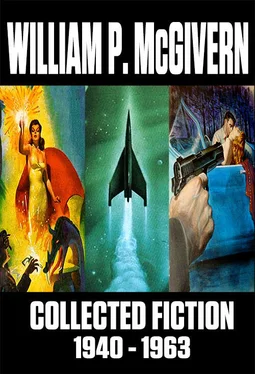Уильям Макгиверн - Collected Fiction - 1940-1963
Здесь есть возможность читать онлайн «Уильям Макгиверн - Collected Fiction - 1940-1963» весь текст электронной книги совершенно бесплатно (целиком полную версию без сокращений). В некоторых случаях можно слушать аудио, скачать через торрент в формате fb2 и присутствует краткое содержание. Год выпуска: 2014, Издательство: Jerry eBooks, Жанр: Ужасы и Мистика, Фантастика и фэнтези, Детектив, Прочие приключения, на английском языке. Описание произведения, (предисловие) а так же отзывы посетителей доступны на портале библиотеки ЛибКат.
- Название:Collected Fiction: 1940-1963
- Автор:
- Издательство:Jerry eBooks
- Жанр:
- Год:2014
- ISBN:нет данных
- Рейтинг книги:3 / 5. Голосов: 1
-
Избранное:Добавить в избранное
- Отзывы:
-
Ваша оценка:
- 60
- 1
- 2
- 3
- 4
- 5
Collected Fiction: 1940-1963: краткое содержание, описание и аннотация
Предлагаем к чтению аннотацию, описание, краткое содержание или предисловие (зависит от того, что написал сам автор книги «Collected Fiction: 1940-1963»). Если вы не нашли необходимую информацию о книге — напишите в комментариях, мы постараемся отыскать её.
Collected Fiction: 1940-1963 — читать онлайн бесплатно полную книгу (весь текст) целиком
Ниже представлен текст книги, разбитый по страницам. Система сохранения места последней прочитанной страницы, позволяет с удобством читать онлайн бесплатно книгу «Collected Fiction: 1940-1963», без необходимости каждый раз заново искать на чём Вы остановились. Поставьте закладку, и сможете в любой момент перейти на страницу, на которой закончили чтение.
Интервал:
Закладка:
William P. McGivern died in Palm Desert, California in 1982.
John Brown’s Body
First published in the May 1940 issue of Amazing Stories .
A strange thing happened when John Brown and his boss fell into the giant washer — a very strange thing indeed...
“Throckmorton making an inspection — this morning!” John Brown uttered the words in a horrified tone. His hands fluttered nervously. He looked helplessly around the washing machine department of Throckmorton’s Department Store, then back at his fellow salesman, suddenly trembling.
“Oh, dear,” he gasped, “I just know something will go wrong. I never was lucky on Mondays.”
Thaddeus Throckmorton, owner and president of the store, would make one of his surprise tours of inspection this morning, and when Thaddeus Throckmorton “toured” there wasn’t a department, section, or counter that was safe from his pompous, if none too nimble-witted, speeches and suggestions.
Mr. Brown had reason to tremble. For he had worries. Overdue payments to the Acme Loan Company, the interdepartment sales contest, and now, to top it all off, the visit from President Throckmorton himself. John Brown prayed fervently that the collector from the loan company wouldn’t come barging into the store while the Boss was around.
As he heard Mr. Throckmorton’s booming voice coming down the aisle, he even thought of running madly from the store. But instead his watery blue eyes darted nervously over the familiar shining line of washers, swung to the middle of the floor, and rested I on the giant model washing machine I that had just been installed for advertising purposes.
A huge affair — six feet high and six feet wide — it had been the result of a brainstorm by Thaddeus Throckmorton himself. On his last visit to John Brown’s department, Mr. Throckmorton, after “tsking” at the lamentable lack of sales, hit upon the idea of a colossal, glorified washer to lure customers closer to John Brown’s wares.
Even John Brown was forced to admit the idea was a honey. And as the sounds of Mr. Throckmorton’s voice grew closer, the little washing machine salesman stepped closer to the gigantic display machine and with his handkerchief flicked a microscopic atom of dust from one of the steel braces.
Exactly three seconds later John Brown’s heart plummeted to his heels, then promptly shot upward to catch somewhere in the region of his throat. Mr. Throckmorton had arrived!
The president and owner of Throckmorton’s Department Store did not enter the washing machine sector — he invaded it. A general at the head of his legions could not have impressed John Brown more than the portly Mr. Throckmorton, followed by subalterns, did at that moment.
John Brown coughed, almost strangling, then blurted a squeaky “Good morning.” Then, hastily in afterthought; “—sir!”
Mr. Throckmorton’s large, expensively clad body turned to face the stooped, drab little salesman. The president was dignified, pompous, and impressive. But no one could say he was not democratic. He said, “Good morning, Brown.”
Then, with a firm, searching, uncompromising eye, Mr. Throckmorton surveyed the section in which he stood. An almost paternal gleam shot into his eye as he spied the colossal display machine.
“Sales improved any since this has been installed, Brown?” inquired Mr. Throckmorton in a tone of voice which implied that sales damned well should have improved.
“Yes,” said the breathless Mr. Brown. “Yes, sir.”
“Harrumph,” the owner made a pleasurable noise in his throat. “Harrumph, quite naturally.” He strode to where the machine stood in the center of the section and, raising himself on tip-toe, peered into its depths.
“Pardon me, sir,” ventured Mr. Brown. “Pardon me, but you can obtain a much more satisfactory view of the inner workings from the special platform on the other side.”
“Capital,” said Mr. Throckmorton. “Very interesting exhibit. My own idea, I might add.”
Mr. Brown led his employer to the other side of the machine where they ascended a series of wooden steps leading to an elevated platform from which they could gaze comfortably down into the bowels of the machine.
“Big, isn’t it?” said John Brown, peering over his employer’s shoulder.
“Quite,” said Mr. Throckmorton proudly. “Biggest of its kind. Turn it on, please.”
John Brown bent over and his hand found the switch that started the huge machine revolving. As the noise of the motor picked up momentum he stared in rapt fascination at the giddying whirl of paddles and discs inside the spacious stomach of the washer. By the time he straightened up the humming had grown to a smooth roar. He stepped forward to gaze downward. Then, like a bursting bomb insofar as results were concerned, the terrible thing happened.
His feet tangled with the electric cord that ran along the platform, and in the next instant he lost his balance and lunged forward. His bony shoulder drove into Mr. Throckmorton’s wide back, and for an awful minute they staggered on the brink of the machine.
And the next instant, with a hoarse bass bellow from Mr. Throckmorton and a shrill soprano scream from John Brown, they tumbled into the whirring machine.
The screaming whistle of the revolving demonstrator, the roar of the motor, the wild shrieks and shouts that issued from the washer all blended together in a weird crescendo, instantly creating a commotion in the store.
Salesmen and clerks, floorwalkers and customers, all raced to the spot. Mr. Darnell, of neckties and ribbons, arrived first. He ran up the steps in back of the machine and yelled over his shoulder, “Get a stretcher. Somebody fell into the big washer.” He threw off the switch and stared with anticipatory horror as the huge disc began to slow down, expecting to find a tangled mass of arms and legs. But instead, as the revolutions decreased, he was amazed to see both occupants unscathed and unharmed.
It was a further shock when he recognized the portly frock-coated figure of the store’s president. Mr. Throckmorton seemed to be all right and was making a ludicrous attempt to rise to his feet in spite of the rotating machine. The other figure in the machine was sitting up with his hand pressed tightly over his eyes.
The frock-coated figure of Mr. Throckmorton staggered a little and then collapsed in a very undignified heap. He stared wildly about, then threw an arm about his face.
“Please,” he wailed, “it was an accident. I couldn’t help it. I stumbled. Please forgive me,” Mr. Throckmorton said. “Please, don’t fire me!”
The small figure in the sack-like brown suit sat up with a jerk, shaking his head. “You stupid clumsy fool,” he bellowed. “You damned near killed me. I’ll have you fired so fast it’ll take your breath away!”
Mr. Darnell, of neckties and ribbons, opened and closed his mouth like a gaping fish. Was he crazy, or was Brown really giving Throckmorton hell? And was Throckmorton begging Brown not to fire him? It was incredible.
The large impressive figure in the frock-coat was on his knees almost crying over the rumpled little man in the baggy brown suit.
“Oh please,” Mr. Throckmorton begged, “give me another chance.” He fumbled in his pocket for a handkerchief, wiping a tear from his eye. “I couldn’t help it,” he wailed again. “It was an acrid—” His voice broke, faltered and stopped in his throat.
He stared incredulously at the large diamond cuff links that were attached to his shirt. Like a man in a dream his eyes traveled up his fat arms and down his expansive front. Diamond stickpin, figured cravat, silk shirt, expensive English suit. Horror-stricken, he felt his face. Soft smooth skin, double chin, fat bulging jowls. Panic-stricken he climbed to his feet.
Читать дальшеИнтервал:
Закладка:
Похожие книги на «Collected Fiction: 1940-1963»
Представляем Вашему вниманию похожие книги на «Collected Fiction: 1940-1963» списком для выбора. Мы отобрали схожую по названию и смыслу литературу в надежде предоставить читателям больше вариантов отыскать новые, интересные, ещё непрочитанные произведения.
Обсуждение, отзывы о книге «Collected Fiction: 1940-1963» и просто собственные мнения читателей. Оставьте ваши комментарии, напишите, что Вы думаете о произведении, его смысле или главных героях. Укажите что конкретно понравилось, а что нет, и почему Вы так считаете.

![Уильям Макгиверн - Завтра опять неизвестность [английский и русский параллельные тексты]](/books/35168/uilyam-makgivern-zavtra-opyat-neizvestnost-angli-thumb.webp)









